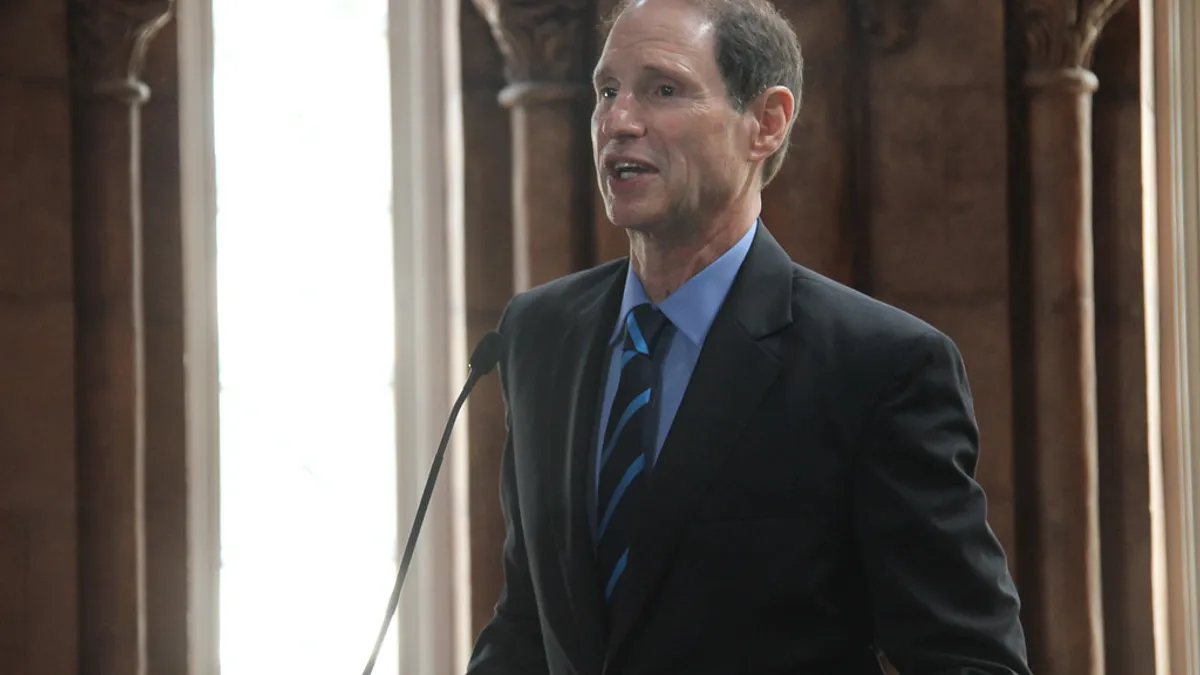Dive Brief:
-
Despite Democratic efforts, the renewable energy industry will likely not see a tax credit extension under the comprehensive Senate energy bill, Sen. Ron Wyden, D-Ore., told an audience of renewables groups at the American Council on Renewable Energy (ACORE) policy forum on Wednesday.
-
Wyden on Tuesday filed an amendment that would extend tax credits for wind and solar, and expand their application to other clean energy technologies, but he expressed skepticism that the amendment could make it through the Republican-majority Senate. "Unless we have a miracle on the floor … we're not going to win this round," he said. "I wish I could come in and tell you otherwise."
-
His skepticism came alongside comments from House members that provisions of the bill will need to change for it to receive support from the Democratic-majority chamber. Rep. Paul Tonko, D-N.Y., told reporters that removing building code updates from the package, for example, "is a major, major problem" for its prospects in the House.
Dive Insight:
Many in the energy industry are excited to see the Senate pushing through a substantial energy legislative package, introduced last week by Chair of the Senate Committee on Energy and Natural Resources Sen. Lisa Murkowski, R-Alaska, and Ranking Member Sen. Joe Manchin, D-W.Va.
The legislation, which includes almost 50 bills introduced in 2019, many of which received bipartisan support, is Congress' best bet to make a dent in federal clean energy policy under the Trump administration, according to some experts.
"This is harvesting the low-hanging fruit that is often discussed," said Tonko. He said his support for the bill doesn't mean he's given up on more aggressive climate legislation, such as the CLEAN Future Act, which he introduced in draft form in January.
"I want to move our nation into a clean energy future as quickly as possible. That means being ready to enact major legislation at the earliest opportunity, and trying to pass achievable bills in the near term," he said. "We know many of the new and big ideas [of the CLEAN Future Act] won't be enacted by this Administration."
But barriers in the House still remain, said Tonko, who serves on the House Committee on Energy and Commerce and chairs the Subcommittee on Environment and Climate Change. Amendments extending tax credits and updating the building code will be needed to secure his full support and likely the support of other House members, he said.
"I would think that there's an ability to go forward in this session, but ... it depends on how well it's received in the House," he told reporters.
Wyden's tax extenders would expand electric vehicle tax credits and extend them to fuel cell vehicles; extend the investment tax credit and production tax credit for solar, wind and renewables; expand the ITC to include standalone storage, offshore wind and waste fuel; and extend credits and deductions for energy efficient homes and buildings.
But Wyden, Ranking Member on the Senate Finance Committee who led a taskforce focused on tax credit extenders in 2019, doesn't see it getting in the package, despite its support in the House.
It's "too soon" to tell if the exclusion of the buildings codes and tax credits will be a deal breaker for House committee members, said Tonko.
One barrier to including tax extensions in the bill is the fact that revenue measures have to begin in the House, "so adding the tax amendment ... could kill the bill," Chris Conlin, who serves as tax counsel to the Senate Finance Committee majority, said during the ACORE conference.
"Maybe there are procedural ways to get around that. But at the least, it would clog things up," he said.
Deployment is the number one thing the renewable energy industry is concerned about and incentives are critical to deployment, according to renewable energy industry officials.
"We think it's really critical at this point that any energy legislation emerging from Congress do more than promote research and development," ACORE CEO Gregory Wetstone told Utility Dive. "Even productive research and development is not going to pay off for many years. Really, we're looking for provisions that will incentivize the deployment technologies available today."
The Senate voted 90-4 on Wednesday to begin debating the bill.















